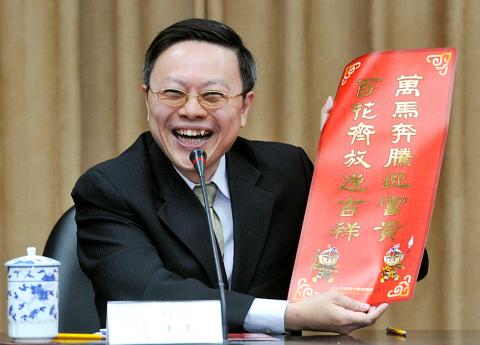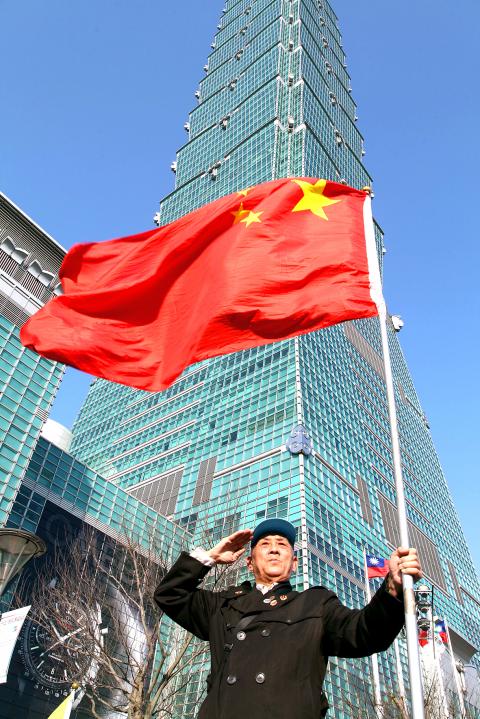Mainland Affairs Council (MAC) Minister Wang Yu-chi (王郁琦) announced yesterday that he is to meet with his Chinese counterpart, China’s Taiwan Affairs Office (TAO) Director Zhang Zhijung (張志軍), in Nanking, China, on Feb. 11, and said political issues would not be on the agenda of their talks.
During their meeting, Chang and Wang will address cross-strait issues and seek to improve mutual understanding between the two sides, Wang said.
The officials are not scheduled to discuss cross-strait political issues or other sensitive topics such as human rights, he said.

Photo: Chien Jung-fong, Taipei Times
“The trip aims to promote regular interactions between the MAC and the TAO, and deepen mutual understanding. I think it’s better to make this meeting simple,” Wang told a press conference at the council’s offices.
According to the Chinese-language United Daily News, Chinese authorities have imposed many restrictions on the topics that will be addressed at the meeting between Wang and Zhang.
Beijing has stipulated a number of requirements for Wang’s visit, including that no talks be held on political matters, Taiwan’s national title — “the Republic of China” (ROC) — and no mention is made of terms such as “freedom,” “democracy,” “rule of law” or “president,” the United Daily News quoted an unnamed source as saying.

Photo: EPA
Wang yesterday did not confirm whether China demanded that sensitive terms, including the ROC and the minister’s official title, should not be mentioned during his meeting with Zhang, but insisted that the MAC will defend the nation’s sovereignty.
“I will say what I need to say on appropriate occasions. Please wait and see… However, I will be disappointed if the TAO does not address me using my official title,” he said.
The Wang-Zhang meeting will be the first official meeting in 65 years between top officials from both sides of the Strait.
Wang and Zhang first met in October last year when they sat in on a meeting between former vice president Vincent Siew (蕭萬長) and Chinese President Xi Jinping (習近平) on the sidelines of an APEC meeting in Bali, Indonesia.
Topics on the agenda for the Wang-Zhang meeting will include a communication mechanism between the two governments, the creation of representative offices on either side of the Taiwan Strait, regional economic integration and Taiwanese students’ health insurance policies when studying in China.
Wang dismissed concerns that his meeting with Zhang would pave the way for President Ma Ying-jeou (馬英九) to meet with Chinese President Xi Jinping (習近平), and said the visit aimed to enhance communication between the MAC and the TAO.
Wang is scheduled to depart for China on Feb. 11 and return to Taiwan on Feb. 14.
He is to meet with Zhang in Nanjing on Feb. 11, and visit the mausoleum of Sun Yat-sen (孫逸仙), the founding father of the ROC, on Feb. 12.
He is to travel to Shanghai on Feb. 13 and meet with local think tanks before returning to Taiwan on Feb. 14.
The Democratic Progressive Party (DPP) yesterday warned Wang against touching upon “unnecessary political issues” during his upcoming trip.
“Wang should have a perfect understanding of what he should and should not raise during his visit based on three principles: protection of Taiwan’s sovereignty, transparency and legislative monitoring,” said Joseph Wu (吳釗燮), executive director of the DPP’s Policy Research Committee.
What Wang should be discussing with Zhang includes human rights and freedom, renegotiation of the cross-strait service trade agreement, implementation of the joint fight against crime and a mutual legal assistance agreement, as well as an investment protection agreement, Wu said.
Issues with political implications and sensitivity, including the “one China” principle, a termination of hostility, a peace agreement, a military confidence-building mechanism as well as unification or a political arrangement prior to eventual unification should not be raised, Wu said.
Wu also called on the Chinese government to release all imprisoned rights activists, naming in particular Xu Zhiyong (許志永), who was sentenced to four years in prison on Sunday, before the Lunar New Year holiday if Beijing is sincere in showing the international community that it adheres to universal values.
Additional reporting by CNA

US President Donald Trump yesterday announced sweeping "reciprocal tariffs" on US trading partners, including a 32 percent tax on goods from Taiwan that is set to take effect on Wednesday. At a Rose Garden event, Trump declared a 10 percent baseline tax on imports from all countries, with the White House saying it would take effect on Saturday. Countries with larger trade surpluses with the US would face higher duties beginning on Wednesday, including Taiwan (32 percent), China (34 percent), Japan (24 percent), South Korea (25 percent), Vietnam (46 percent) and Thailand (36 percent). Canada and Mexico, the two largest US trading

China's military today said it began joint army, navy and rocket force exercises around Taiwan to "serve as a stern warning and powerful deterrent against Taiwanese independence," calling President William Lai (賴清德) a "parasite." The exercises come after Lai called Beijing a "foreign hostile force" last month. More than 10 Chinese military ships approached close to Taiwan's 24 nautical mile (44.4km) contiguous zone this morning and Taiwan sent its own warships to respond, two senior Taiwanese officials said. Taiwan has not yet detected any live fire by the Chinese military so far, one of the officials said. The drills took place after US Secretary

CHIP EXCEPTION: An official said that an exception for Taiwanese semiconductors would have a limited effect, as most are packaged in third nations before being sold The Executive Yuan yesterday decried US President Donald Trump’s 32 percent tariff on Taiwanese goods announced hours earlier as “unfair,” saying it would lodge a representation with Washington. The Cabinet in a statement described the pledged US tariffs, expected to take effect on Wednesday next week, as “deeply unreasonable” and “highly regrettable.” Cabinet spokeswoman Michelle Lee (李慧芝) said that the government would “lodge a solemn representation” with the US Trade Representative and continue negotiating with Washington to “ensure the interests of our nation and industries.” Trump at a news conference in Washington on Wednesday announced a 10 percent baseline tariff on most goods

THUGGISH BEHAVIOR: Encouraging people to report independence supporters is another intimidation tactic that threatens cross-strait peace, the state department said China setting up an online system for reporting “Taiwanese independence” advocates is an “irresponsible and reprehensible” act, a US government spokesperson said on Friday. “China’s call for private individuals to report on alleged ‘persecution or suppression’ by supposed ‘Taiwan independence henchmen and accomplices’ is irresponsible and reprehensible,” an unnamed US Department of State spokesperson told the Central News Agency in an e-mail. The move is part of Beijing’s “intimidation campaign” against Taiwan and its supporters, and is “threatening free speech around the world, destabilizing the Indo-Pacific region, and deliberately eroding the cross-strait status quo,” the spokesperson said. The Chinese Communist Party’s “threats